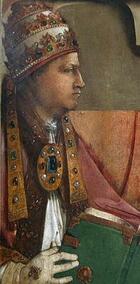
Pius II (Corsignano, October 18, 1405-Ancona, August 14, 1464) was an Italian ecclesiastic and humanist, 210th pope of the Catholic Church, from August 19, 1458 until his death.
Successor of Calixtus III, he fomented during his pontificate a new crusade against the Turks, after the Fall of Constantinople (1453), for which he gathered a congress in the city of Mantua (1459-1461), and that finally never would materialize.
He was one of the most notable humanists of his time and protected the arts and letters. In 1460 he founded the University of Basel. His longest and most enduring work, Commentarii rerum memorabilium quae temporibus suis contigerunt (1463), is the only autobiography of a pontiff published during its author's lifetime.
His name was Aeneas Silvio Piccolomini. He was born in Corsignano, a small Tuscan town about 30 miles southeast of Siena. His parents, Silvio Piccolomini and Vittoria Forteguerri, belonged to a noble lineage that had come down as a result of the factional struggles in the Sienese Republic, had moved to the village and was in a state of certain economic hardship. His father made some money serving in the Visconti mercenary armies, laid down his arms and bought land to farm. They had 18 children but only three survived.
The family made an effort so that Eneas Silvio could study. At the age of 18 he went to Siena, where he pursued legal studies rather reluctantly, alternating them with passionate readings of the Greco-Latin classics. He shared a desk with the poet Antonio Beccadelli. His closest educator in Siena was Mariano de'Sozzini, a jurist open to new humanistic currents.
He then gave himself over to a kind of formative wandering through academic cities: in Florence he heard the torrential and wise Francesco Filelfo, whose classes he attended for two years in the company of another future pope, Tomaso Parentucelli, being also a famulus in his house for two months. . He was also in contact with the maestro Poggio Bracciolini; in Ferrara he met the Sicilian poet Giovanni Aurispa, who was to become his friend, and Guarino of Verona, translator of Strabo in the copies that the young Aeneas had read. In addition, he worked a lot on his behalf, and at the age of 26 he was already a shrewd Latinist, capable of writing in that language in a simple, elegant and effective way, as well as a master of rhetoric. His talents also reached the composition of Latin verses.
As an intellectual without money, he was offered the dilemma between the church or the legal profession. Since jurisprudence bored him and Saint Bernardino of Siena himself advised him against entering religion, he chose a middle path. Thus, he entered the service of hierarchs of the Church - embarked at that time on schisms and conflicts of power - as a secretary, speaker and diplomat, and he launched himself to tour the Central European territories for years.






